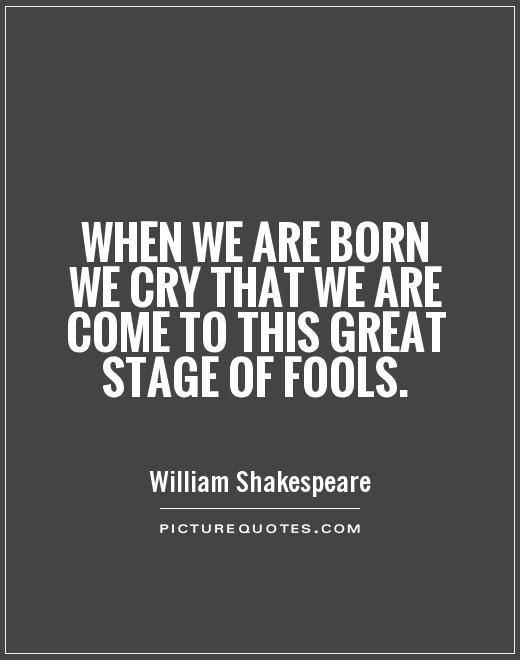When we are born we cry that we are come to this great stage of fools

When we are born we cry that we are come to this great stage of fools
Babies are truly fascinating creatures. From the moment they are born, they enter this world with a clean slate, ready to absorb and learn everything around them. They are like sponges, soaking up information and experiences at an incredible rate. However, despite their innocence and vulnerability, babies are not without their own wisdom.The quote “When we are born we cry that we are come to this great stage of fools” is often attributed to William Shakespeare, and it perfectly captures the paradox of infancy. On one hand, babies are completely dependent on others for their care and survival. They are unable to communicate their needs in words, relying instead on cries and gestures to convey their emotions. In this sense, they may be seen as “fools” in the sense that they are unaware of the complexities and challenges of the world around them.
On the other hand, babies possess a profound understanding of the human experience that is often overlooked. They are born with an innate sense of curiosity and wonder, constantly exploring and discovering new things. They are also incredibly resilient, adapting to new environments and challenges with remarkable ease. In this sense, babies may be seen as wise beyond their years, possessing a deep understanding of the world that is unencumbered by preconceived notions or biases.
One of the most fascinating aspects of babies is their ability to communicate without words. From the moment they are born, babies use a combination of cries, coos, and gestures to express their needs and emotions. While they may not be able to articulate their thoughts in the same way that adults do, babies are incredibly adept at conveying their feelings through nonverbal cues. This form of communication is often referred to as “baby talk,” and it plays a crucial role in the development of language and social skills.
In many ways, “baby talk” is a universal language that transcends cultural and linguistic barriers. Regardless of where they are born or what language they speak, babies around the world use similar sounds and gestures to communicate with their caregivers. This shared language of infancy serves as a powerful reminder of our common humanity, connecting us to our earliest roots and reminding us of the simple joys of childhood.












 Friendship Quotes
Friendship Quotes Love Quotes
Love Quotes Life Quotes
Life Quotes Funny Quotes
Funny Quotes Motivational Quotes
Motivational Quotes Inspirational Quotes
Inspirational Quotes